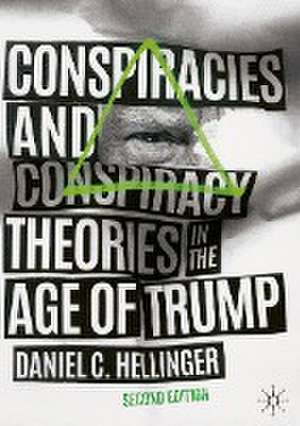Conspiracies and Conspiracy Theories in the Age of Trump
Autor Daniel C. Hellingeren Limba Engleză Hardback – 26 noi 2023
| Toate formatele și edițiile | Preț | Express |
|---|---|---|
| Paperback (1) | 383.99 lei 6-8 săpt. | |
| Springer International Publishing – 28 dec 2018 | 383.99 lei 6-8 săpt. | |
| Hardback (1) | 694.55 lei 38-44 zile | |
| Springer International Publishing – 26 noi 2023 | 694.55 lei 38-44 zile |
Preț: 694.55 lei
Preț vechi: 763.25 lei
-9% Nou
Puncte Express: 1042
Preț estimativ în valută:
133.02€ • 137.05$ • 111.43£
133.02€ • 137.05$ • 111.43£
Carte tipărită la comandă
Livrare economică 18-24 februarie
Preluare comenzi: 021 569.72.76
Specificații
ISBN-13: 9783031448287
ISBN-10: 3031448286
Pagini: 288
Ilustrații: XXI, 288 p. 5 illus., 1 illus. in color.
Dimensiuni: 148 x 210 mm
Ediția:2nd ed. 2023
Editura: Springer International Publishing
Colecția Palgrave Macmillan
Locul publicării:Cham, Switzerland
ISBN-10: 3031448286
Pagini: 288
Ilustrații: XXI, 288 p. 5 illus., 1 illus. in color.
Dimensiuni: 148 x 210 mm
Ediția:2nd ed. 2023
Editura: Springer International Publishing
Colecția Palgrave Macmillan
Locul publicării:Cham, Switzerland
Cuprins
Chapter 1. Theorizing Conspiracy, Conspiracy Theories.- Chapter 2. Paranoia, Conspiracy Panic, and the Regime of Truth.- Chapter 3. New Conspiracism, Fake News, and QAnon.- Chapter 4. Conspiracies in the Voting Booth.- Chapter 5. Globalization, Populism, Conspiracism.- Chapter 6. Dark Money and Trumpism.- Chapter 7. The Deep State, Hegemony, Democracy.- Chapter 8. American Conspiracism Before and After January 6, 2021.
Notă biografică
Daniel C. Hellinger is Professor Emeritus of Political Science at Webster University, USA. Among his previous publications are “Paranoia, Conspiracy, Hegemony in American Politics” in Transparency and Conspiracy: Ethnographies of Suspicion in the New World Order (2003), (co-authored )The Democratic Façade (2nd edition, 1991), Comparative Politics of Latin America: Democracy at Last? (2014), and (co-editor, contributor) Bolivarian Democracy in Venezuela: Participation, Politics and Culture (2011).
Textul de pe ultima copertă
“A rare effort that prompts us to consider that conspiracy theories exist as do conspiracies. Finding a way to hold both phenomena in our minds without letting one overwhelm the other is a task and project that few are willing to undertake. Thank goodness Hellinger does it.”
– Jack Z. Bratich, Associate Professor of Communications, Rutgers University
“This is a cracking book. A fantastically rich and compelling analysis. It fills a lacuna of social science theorization of conspiracy with a superbly crafted and updated contribution.”
– Julia Buxton, British Academy Global Professor, Criminology, University of Manchester
Conspiracies and Conspiracy Theory in the Age of Trump stands out in the burgeoning literature on conspiracism with its call for political scientists to analyze not only “conspiracy theory” as political pathology but conspiracies themselves as political behavior symbiotically related to moral hazards and other forces unleashed by dark money, disinformation, changing technologies, and globalization. This new updated edition extends this analysis to the belief by many Americans that the 2020 election was stolen, resistance to social measures to counter the Covid epidemic, attempts by Trump and his allies to “stop the steal,” and the resulting mob insurrection at the Capitol on January 6. We likely will see both conspiracism and actual conspiracies play a greater role due to institutional decay in American politics. For this reason, political scientists need to analyse and theorize the role of conspiracies in politics—why they prosper and fail, how conspiracies may inflect political outcomes, what relationship they bear to social forces unleashed by great economic and social change.Daniel C. Hellinger is Professor Emeritus of Political Science at Webster University, USA. Among his previous publications are “Paranoia, Conspiracy, Hegemony in American Politics” in Transparency and Conspiracy: Ethnographies of Suspicion in the New World Order (2003), (co-authored )The Democratic Façade (2nd edition, 1991), Comparative Politics of Latin America: Democracy at Last? (2014), and (co-editor, contributor) Bolivarian Democracy in Venezuela: Participation, Politics and Culture (2011).
– Jack Z. Bratich, Associate Professor of Communications, Rutgers University
“This is a cracking book. A fantastically rich and compelling analysis. It fills a lacuna of social science theorization of conspiracy with a superbly crafted and updated contribution.”
– Julia Buxton, British Academy Global Professor, Criminology, University of Manchester
Conspiracies and Conspiracy Theory in the Age of Trump stands out in the burgeoning literature on conspiracism with its call for political scientists to analyze not only “conspiracy theory” as political pathology but conspiracies themselves as political behavior symbiotically related to moral hazards and other forces unleashed by dark money, disinformation, changing technologies, and globalization. This new updated edition extends this analysis to the belief by many Americans that the 2020 election was stolen, resistance to social measures to counter the Covid epidemic, attempts by Trump and his allies to “stop the steal,” and the resulting mob insurrection at the Capitol on January 6. We likely will see both conspiracism and actual conspiracies play a greater role due to institutional decay in American politics. For this reason, political scientists need to analyse and theorize the role of conspiracies in politics—why they prosper and fail, how conspiracies may inflect political outcomes, what relationship they bear to social forces unleashed by great economic and social change.Daniel C. Hellinger is Professor Emeritus of Political Science at Webster University, USA. Among his previous publications are “Paranoia, Conspiracy, Hegemony in American Politics” in Transparency and Conspiracy: Ethnographies of Suspicion in the New World Order (2003), (co-authored )The Democratic Façade (2nd edition, 1991), Comparative Politics of Latin America: Democracy at Last? (2014), and (co-editor, contributor) Bolivarian Democracy in Venezuela: Participation, Politics and Culture (2011).
Caracteristici
Argues that Trumpian efforts to “stop the steal” stoked paranoid conspiracism Call for political scientists to theorize conspiracies as political behaviour symbiotically tied to political decay Examines the role of capitalist globalization and inequality in promoting conspiracy and conspiracism
